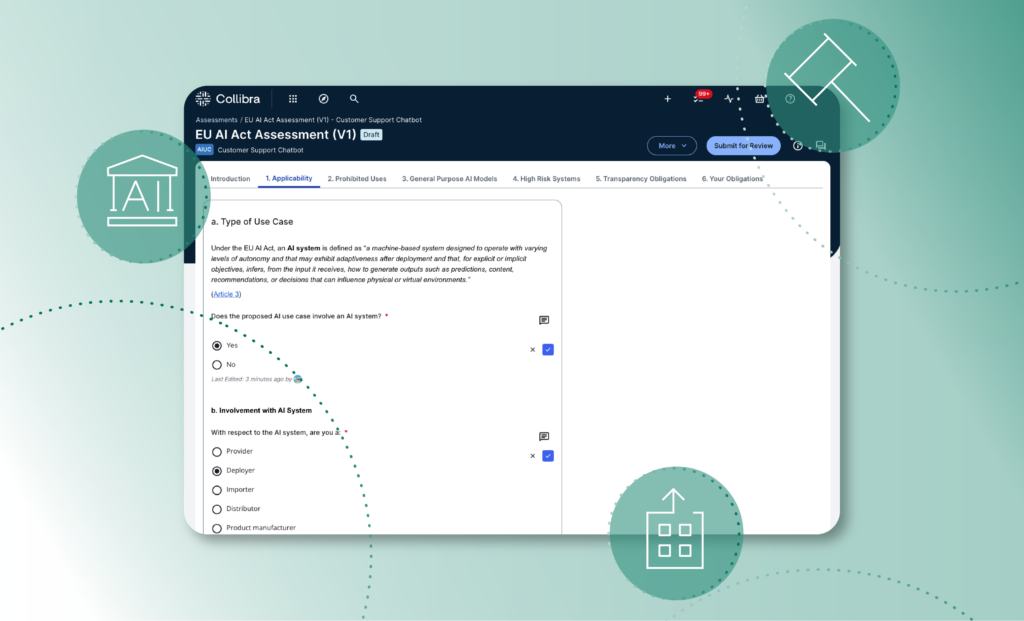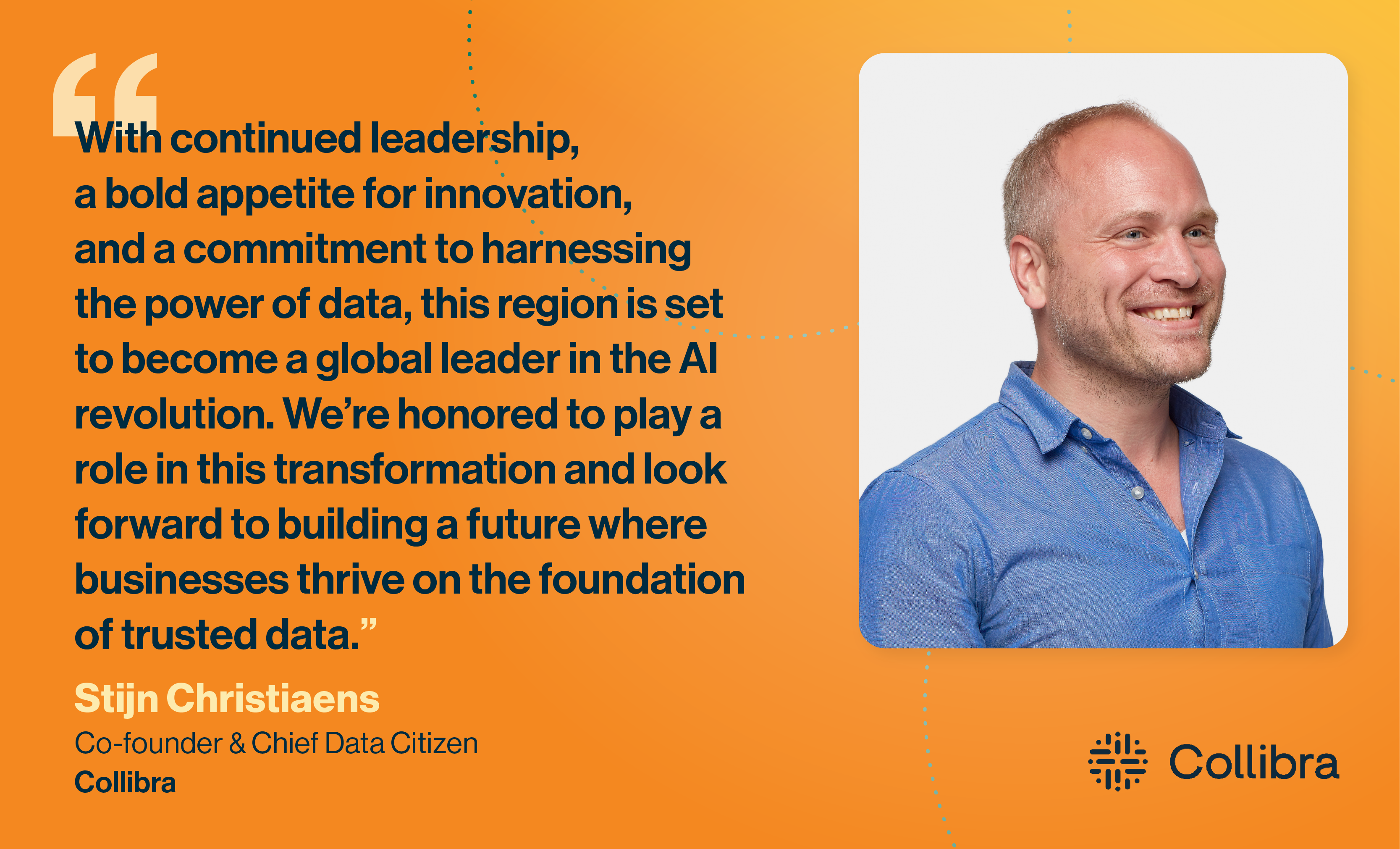As AI rapidly reshapes industries, many teams are laser-focused on ML, Models and technology, believing these elements will drive transformative results. However, a recently released report from BCG’s reveals a different story: BCG’s 10-20-70 model emphasizes that while data science capabilities (10%) and a scalable tech stack (20%) are essential foundations, they are not enough to create lasting impact. Instead, effective processes supported by talent, change management and governance (70%) are what truly drive sustainable, scalable AI success.
This finding underscores the importance of creating robust frameworks for AI and data governance and implementing guardrails to ensure AI is not only innovative but also safe, ethical and aligned with business goals. From assessing AI risks to ensuring compliance, Collibra’s Q4 AI Governance innovations contribute their part to the whole. In this blog, let’s dive into these newly released innovations and discover how they ensure AI teams can safely scale their AI use cases with confidence.
Universal AI oversight to supervise all AI use cases regardless of model origins
With AI initiatives spread across departments and often developed on different platforms, Collibra’s universal AI use case oversight provides a single, centralized repository that brings transparency to all AI projects, regardless of model origin. This centralization allows stakeholders to access a unified view of AI use cases across technologies like Vertex AI, Databricks, and now, in Q4, Amazon SageMaker, Microsoft Azure, SAP AI Core followed by Amazon Bedrock in our Beta Program. In practice, this holistic visibility empowers teams to align their projects with strategic goals, accelerate project transparency and foster stakeholder engagement.
By simplifying oversight across multiple tools, and bridging insights into your underlying data, Collibra enables organizations to stay ahead of AI’s complexity and align every initiative with broader organizational objectives.
Configurable AI use case lifecycle management to meet custom needs and requirements of organizational departments
Experience reveals that a one-size-fits-all approach doesn’t work for modern organizations, each with unique business lines and governance needs, as all stakeholders must be engaged, informed and aligned to achieve effective AI governance. In parallel, companies show varying levels of maturity. Some want to start with simple, out-of-the-box models to move quickly, while others seek advanced customization. Collibra is equipped to support both approaches effectively.
Our newly released configurable lifecycle management adapts seamlessly to a wide range of needs, from the simplest to the most sophisticated, including the integration of established best practices. By making workflows configurable yet structured, Collibra ensures that AI governance can be customized to departmental requirements. Coupled with our modern, intuitive user interface, our configurable lifecycle ensures that governance workflows support an AI project’s entire lifecycle, reinforcing the people- and process-centric approach critical for sustainable AI adoption.
Smart EU AI Act assessment to accelerate compliance readiness
Organizations are eager to experiment and adopt AI, but are stalled due to concerns about ensuring compliance with existing and upcoming AI regulations. It’s a challenge that Collibra addresses effectively, drawing on its expertise in creating out-of-the-box (OOTB) templates tailored to regulatory requirements, such as the DPIA and more.
Recognizing this, Collibra’s Q4 release includes an out-of-the-box EU AI Act assessment designed to accelerate compliance readiness and help organizations understand regulatory obligations regarding the EU Act. Automated compliance checks allow teams to evaluate their AI use cases efficiently, applying EU AI Act systematic assessments without the manual burden typically associated with compliance processes. This capability aligns regulatory adherence with business operations, allowing organizations to meet compliance readiness goals as part of their standard workflows rather than as isolated efforts. This integrated approach ensures compliance doesn’t hinder innovation but becomes a seamless aspect of responsible AI governance.
Built-in collaborative capabilities to facilitate accountability on AI use cases
One of the primary obstacles in AI governance is keeping pace with an AI use case’s lifecycle, especially in high-velocity environments. Delays or missed steps or even misinformation can derail an AI initiative or leave the organization vulnerable to non-compliance.
With collaboration capabilities in Collibra’s Q4 release, AI stakeholders are promptly reminded and tagged when inputs are required, keeping the governance process moving without unnecessary lags.
With built-in messaging, stakeholders can discuss assessments in real time, fostering transparency and unifying efforts. Assigning specific assessment tasks to team members reduces bottlenecks, while tagging and notifications ensure timely responses.
This collaborative approach turns assessments into a shared responsibility, empowering cross-functional teams to contribute insights, address issues and maintain alignment—all vital for mitigating the organizational challenges AI can introduce.
Help organizations align AI with their transformation challenges
The complexity of AI governance requires more than isolated tools; it demands a cohesive system that unites visibility, lifecycle management, regulatory compliance and collaboration. Collibra’s Q4 innovations augment this integrated foundation, with reliable, traceable and compliant AI equipping organizations to confidently handle AI’s growing impact both on operational and strategic levels.
***
To gain an in-depth understanding of Collibra’s Q4 AI Governance Innovations and the continuous enhancements powering our release, join our latest product webinar. This session will provide a comprehensive look at the new features within the Collibra Data Intelligence Platform.





